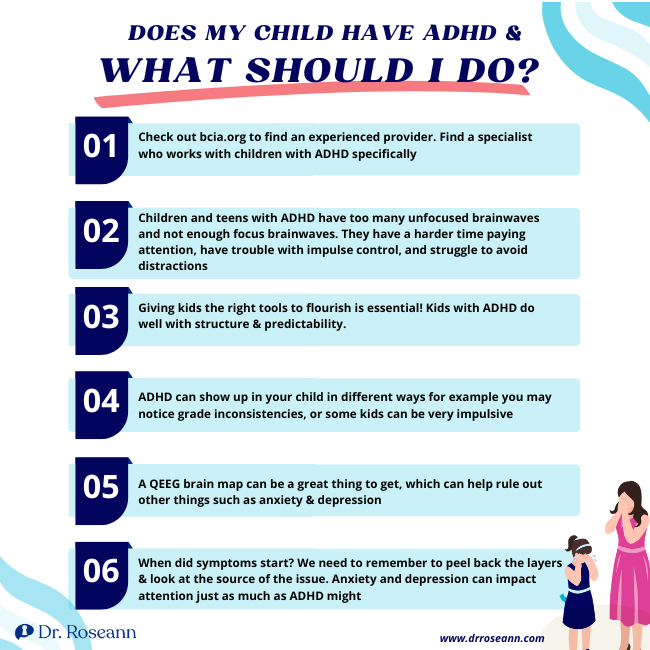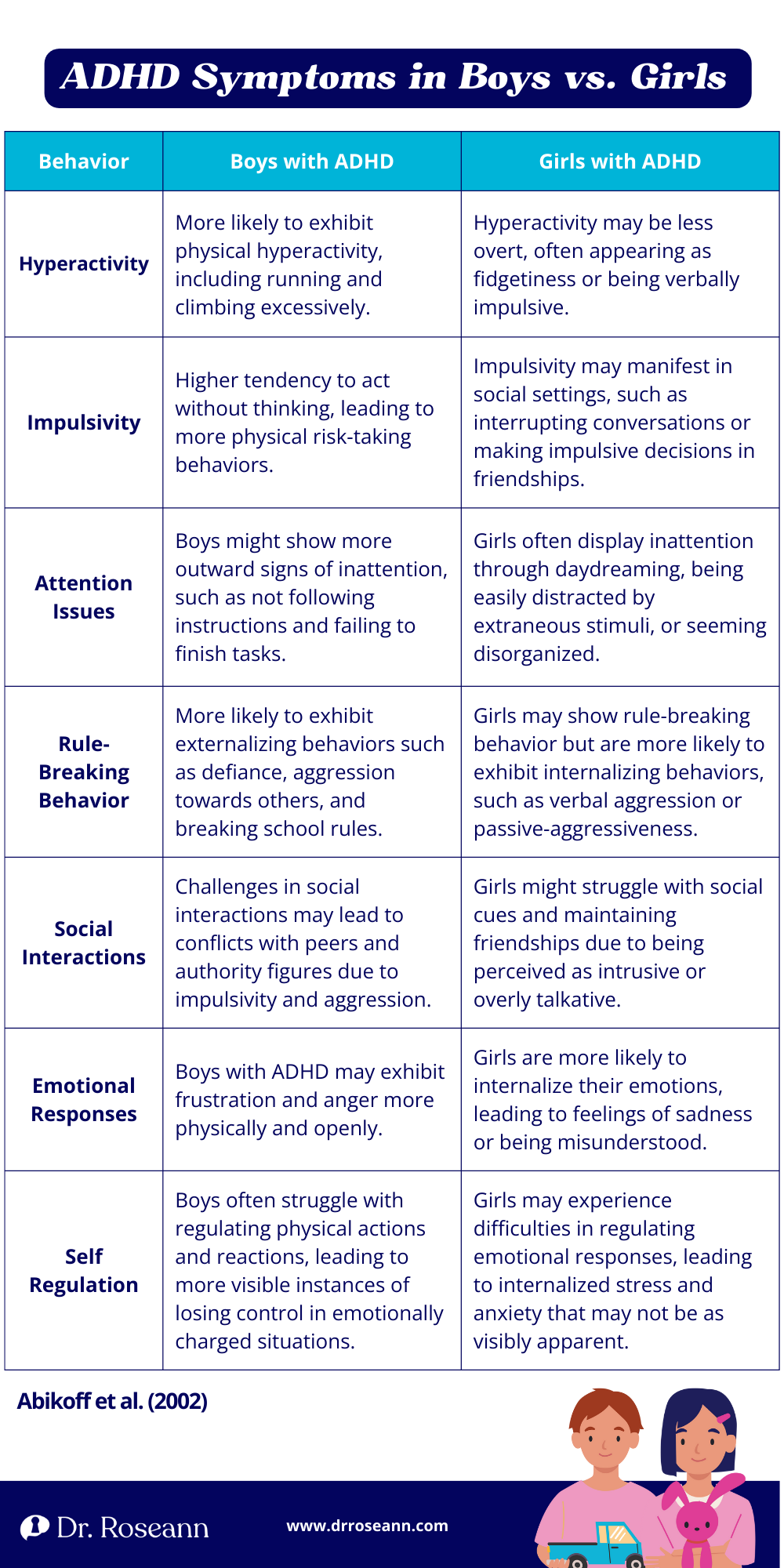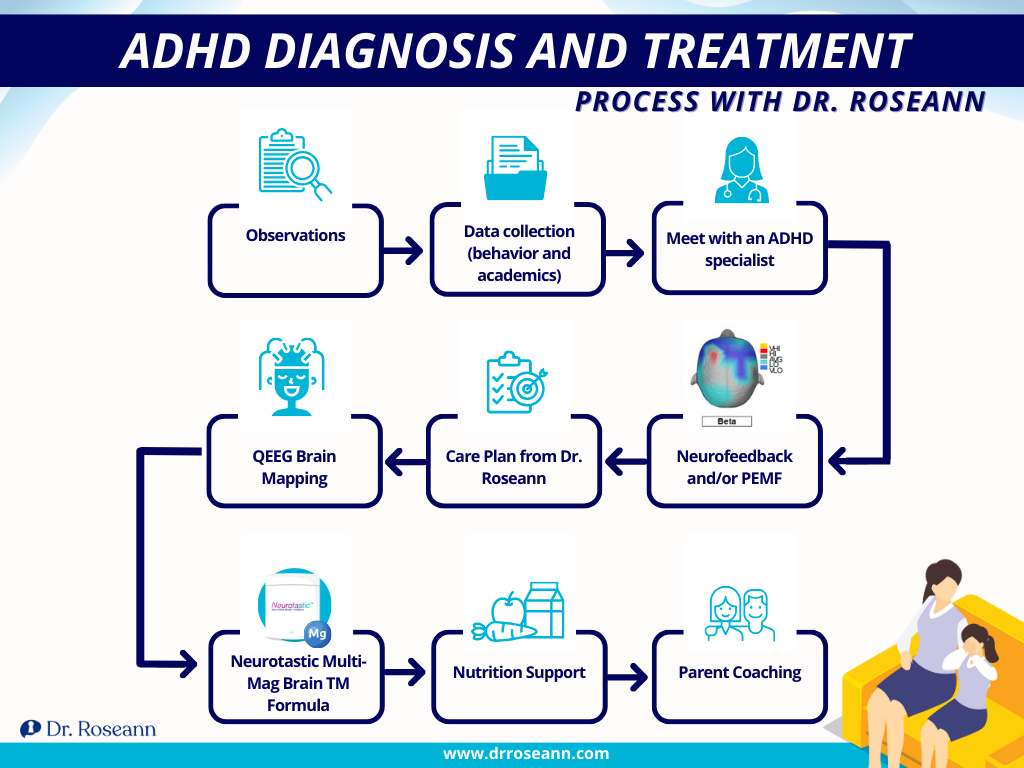We all have heard about ADHD. But do you understand what it is? Parents need to know how kids with ADHD function differently, its signs and symptoms, and how to distinguish ADHD from other disorders, such as learning problems, executive functioning issues, and clinical issues, such as anxiety. Understanding how ADHD is diagnosed is confusing and maybe a long journey for parents, but getting to the root cause is so vital in helping your child thrive.

People with ADHD have brains that work differently. When we look at their brainwave activity with a QEEG brain map, we see that they have too many unfocused and insufficiently focused brainwaves. This combination of brainwaves makes it hard for people with ADHD to pay attention, have impulse control, and avoid distractions.
One study looked at how the QEEG can help diagnose ADHD. They tested 60 kids with ADHD and 20 kids without it. The results showed that the brains of kids with ADHD had more slow waves, less of a certain brain activity called Beta LF, and a higher ratio of Theta/Beta LF compared to kids without ADHD. This shows QEEG might be useful in diagnosing ADHD and understanding what's happening in the brain that causes it (Elmagd Elkholy et al., 2020).
Often, people misunderstand ADHD or even misdiagnose it. We usually think that everyone with attention difficulties always has the brain-based disorder ADHD. However, there are a lot of things that can interfere with our focus and attention.
For example, anxiety, obsessive-compulsive thinking, and inadequate sleep can all make it harder for you to pay attention. So, just because your child can't focus doesn't mean that 100 percent of the time, it is ADHD. You have to look at the root cause to get the proper treatment so your child can be successful at home, school, and socially.
We always need to look at the reasons because problems with attention can creep up and cause challenges at home and school, which is also frustrating for you and your child. Considering what else happens in that child or teen's life is essential. Could it be depression? Anxiety?
A lot of the time, I see anxiety and depression impacting attention in very much the same way that ADHD might affect someone with learning in all areas of life. This is often very surprising to parents, so we need to remember to peel back the layers and look at the source of the issue. We also need to consider when it starts because it is essential to keep in mind that if someone does have ADHD, symptoms need to begin before age seven.
How to Spot ADHD Symptoms
There are many different ways that ADHD can show up in a child. So, understanding the signs and symptoms of ADHD is vital in getting your unfocused child the right kind of help at school and home. Some kids are fun and easygoing but easily distracted, and then some kids with ADHD can be impulsive.
Other kids may call them “obnoxious,” even though that isn't true. However, it means they have difficulty putting their breaks on, which means difficulty with impulse control. This may wear out friendships in school environments and outside of school.
It is hard for kids with ADHD who are impulsive because they don't want to do what they are doing, but they can't seem to slow down enough to switch gears or pump the breaks. This creates a lot of shame for the child or teen with ADHD who is “always in trouble.”
There are also a lot of kids with ADHD who are incredibly bright, and this helps them compensate for attentional and executive functioning issues. They can memorize information at school, so they look much more capable than they are.
These kinds of kids can do very well until you put a lot of work on them with tight deadlines, have to complete tasks requiring a lot of executive functioning, or be very organized. This is when you may notice inconsistent grades, forgetfulness, or behavioral issues as they begin to fail.
For example, you may see your child write a paper but need help finding it, or they never turned in an assignment because they never started it, even though they know the material. When executive functioning is required with a lot of written output, this is when kids with ADHD break down.
As a parent, you may see inconsistencies in your child's grades or what I call their output. One of the things that is hardest for parents to understand about ADHD is that these kids can pay attention to what their brain is interested in, but paying attention to boring things is almost impossible for them.
Their brain hyper-focuses on high-interest areas and wants to ignore stuff in low-interest areas. When someone who does not have ADHD is doing an activity that is boring to them, they can future-think and say, “Well, I need to take this class to pass my licensing exams.” However, an ADHD brain would say, “That is so boring,” and try to find something else that is interesting to them.
Getting their brain to regulate enough to be focused, have good executive functioning, and be able to take independent action is critical to their future success and can be achieved with neurofeedback
How to Spot ADHD Symptoms
There are many different ways that ADHD can show up in a child. So, understanding the signs and symptoms of ADHD is vital in getting your unfocused child the right kind of help at school and home. Some kids are fun and easygoing but easily distracted, and then some kids with ADHD can be impulsive.
Other kids may call them “obnoxious,” even though that isn't true. However, it means they have difficulty putting their breaks on, which means difficulty with impulse control. This may wear out friendships in school environments and outside of school.
It is hard for kids with ADHD who are impulsive because they don't want to do what they are doing, but they can't seem to slow down enough to switch gears or pump the breaks. This creates a lot of shame for the child or teen with ADHD who is “always in trouble.”
There are also a lot of kids with ADHD who are incredibly bright, and this helps them compensate for attentional and executive functioning issues. They can memorize information at school, so they look much more capable than they are.
These kinds of kids can do very well until you put a lot of work on them with tight deadlines, have to complete tasks requiring a lot of executive functioning, or be very organized. This is when you may notice inconsistent grades, forgetfulness, or behavioral issues as they begin to fail.
For example, you may see your child write a paper but need help finding it, or they never turned in an assignment because they never started it, even though they know the material. When executive functioning is required with a lot of written output, this is when kids with ADHD break down.
As a parent, you may see inconsistencies in your child's grades or what I call their output. One of the things that is hardest for parents to understand about ADHD is that these kids can pay attention to what their brain is interested in, but paying attention to boring things is almost impossible for them.
Their brain hyper-focuses on high-interest areas and wants to ignore stuff in low-interest areas. When someone who does not have ADHD is doing an activity that is boring to them, they can future-think and say, “Well, I need to take this class to pass my licensing exams.” However, an ADHD brain would say, “That is so boring,” and try to find something else that is interesting to them.
Getting their brain to regulate enough to be focused, have good executive functioning, and be able to take independent action is critical to their future success and can be achieved with neurofeedback.
How Does ADHD Affect a Child's Behavior?
Attention deficit hyperactivity disorder can profoundly influence a child's behavior, with its distinctive ways of affecting a person’s life. Here’s another illustration: Sarah is a 9-year-old child with ADHD. Sarah often finds it challenging to concentrate on her schoolwork.
She frequently becomes distracted by the slightest noise or movement in the classroom. During math class, while the teacher explains a problem, Sarah's attention wanders, and she needs to catch up on crucial instructions, leading to incomplete assignments and low grades.
Moreover, Sarah's hyperactivity is apparent during recess. While other children play games or sit and chat, Sarah constantly fidgets, unable to remain seated for more than a few minutes. She races around the playground, climbing on equipment with seemingly boundless energy. Despite warnings from the teachers to be careful, Sarah impulsively jumps from the swings, narrowly avoiding accidents.
At home, Sarah's parents notice her organizational struggles. Her room is in perpetual disarray, with toys strewn across the floor and clothes spilling out of her drawers. When asked to tidy up, Sarah becomes overwhelmed, unsure of where to begin, and quickly loses interest in the task. Consequently, her belongings remain scattered, causing frustration for Sarah and her parents.
Furthermore, Sarah's impulsivity often leads to social challenges. During playdates, she struggles to wait her turn in games, frequently interrupting her friends or insisting on her way. This behavior sometimes conflicts with her peers, leaving Sarah feeling misunderstood and isolated.
ADHD profoundly shapes Sarah's behavior, impacting her academic performance, social interactions, and organizational skills. Despite these challenges, with understanding and support from her family, teachers, and healthcare professionals, Sarah can learn strategies to manage her symptoms and thrive in various aspects of her life.
However, ADHD in girls may look different that ADHD in boys. A study by Abikoff et al. (2002) observed the differences in classroom behavior between boys and girls with ADHD, as well as differences based on the presence of other conditions like anxiety disorder or disruptive behavior disorder.
They found that both boys and girls with ADHD behaved differently compared to their peers without ADHD, with boys showing more rule-breaking and externalizing behaviors, while girls showed more verbal aggression.
Additionally, children with comorbid ADHD showed higher rates of rule-breaking and impulsive behavior compared to those with ADHD alone, suggesting that these behaviors are truly present and not just influenced by biases in reporting.

What To Do as a Parent of a Child With ADHD Symptoms
When we start understanding what ADHD is, we can teach our kids about their superpower brains and how they can learn to pay attention even when things seem dull. Giving kids the right tools to flourish and do well is essential. Kids with ADHD also do well with a lot of structure and predictability, so their brains can get to a higher level of work without remembering the routines.
Establishing consistent routines at home is beneficial as they create structured daily schedules for activities like waking up, meals, homework, and bedtime. These help provide predictability and stability, which can comfort your child. Visual schedules and checklists can aid in organization and task management.
Furthermore, teaching your child coping strategies to manage their ADHD symptoms is invaluable. Techniques such as deep breathing exercises, mindfulness practices, or using fidget tools can help them maintain focus and regulate their emotions.
Promoting healthy habits, including adequate sleep, a balanced diet, and limited screen time, supports your child's overall well-being. Additionally, highlighting their strengths and successes is crucial to fostering their self-esteem and resilience.
How Mental Health Professionals Diagnose ADHD
So you may be wondering, “How do I diagnose my child with ADHD?” I am here to tell you that if you suspect your child has ADHD, it is crucial to find a specialist who works with children with ADHD. You also should ensure that there are no medical sources of their difficulties, such as having nutrient deficiencies.
Often, kids with ADHD are diagnosed after only having a simple and short interview. I do something called a QEEG Brain Map, which is a great way to check under the hood and make sure your child does have ADHD while ruling out other things like learning problems, anxiety, or even depression.
ADHD is often misdiagnosed, which can quickly happen because things like learning and processing issues or anxiety can interfere with one's attention. It is a big reason why many kids and teens don't do well on ADHD medication because they simply are misdiagnosed with ADHD when it may be something else.
You have to know what the issue is before you can treat it. It is such a common sense thing that, unfortunately, isn't the standard of care, and instead, the standard of care in mental health is to guess without checking under the hood.
Are you looking to find an experienced neurofeedback provider who can do a brain map or brain check? We work with kids, teens, and families worldwide with our virtual neurofeedback program.
Again, a lot of different sources could be impacting your child's attention, which is why it is imperative to find someone who specializes in ADHD. We want to gather objective data and lab work; QEEGs are my favorite starting method.
Neurofeedback for ADHD is a beautiful and well-researched treatment that regulates the brain so you or your child can focus, shift gears, and have an output that matches their smartness. Check out my blog on Natural Treatments Can Help ADHD and 9 Supplements for ADHD to learn more about holistic treatments and recommendations. For more information, check out my YouTube video on Does My Child Have ADHD?

Is attention deficit hyperactivity disorder is a type of mental disorders?
Yes, attention deficit hyperactivity disorder (ADHD) is classified as a neurodevelopmental disorder, not a mental disorder. It affects a person's ability to focus, control impulses, and regulate their energy levels.
How is ADHD diagnosed in children and teens?
ADHD is typically diagnosed in children and teens through a comprehensive evaluation process, which may include gathering information from parents, teachers, and other caregivers about the child's behavior and symptoms.
How does the disabilities education act address learning disabilities?
The Individuals with Disabilities Education Act (IDEA), formerly known as the Education for All Handicapped Children Act (EAHCA) and sometimes referred to as the Disabilities Education Act, addresses learning disabilities by ensuring that children with disabilities, including specific learning disabilities, receive a free and appropriate public education (FAPE) tailored to their individual needs.
How can a child's school teacher help with behavioral therapy?
A child's teacher can support behavioral therapy by reinforcing positive behaviors, implementing visual supports and structured routines, and collaborating with the child's therapist and parents to ensure consistency and effectiveness in addressing behavioral challenges.
Why are people with childhood ADHD diagnoses prone to careless mistakes and self-control issues?
People with childhood ADHD diagnoses are prone to careless mistakes and self-control issues due to underlying neurobiological differences that affect their attention regulation, impulse control, and executive functioning.
How is the condition called Attention Deficit Disorder (ADD) different from an ADHD diagnosis?
Attention deficit disorder (ADD) is an outdated term that was previously used to describe individuals who primarily exhibited symptoms of inattention without hyperactivity or impulsivity. In contrast, ADHD (Attention Deficit Hyperactivity Disorder) encompasses both inattentive and hyperactive-impulsive presentations, as well as a combined presentation where both sets of symptoms are present.
Can parenting skills training help with brain development?
Parenting skills training can indirectly support healthy brain development in children by providing caregivers with the knowledge and tools to create nurturing, supportive environments that promote optimal cognitive, emotional, and social development.
How can you address sleep disorders and trouble paying attention connected to a child's ADHD?
To address sleep disorders and trouble paying attention connected to a child's ADHD, establish a consistent bedtime routine to promote better sleep quality. Consider behavioral therapy for insomnia, adjust medication timing or dosage under the guidance of healthcare professionals, and encourage regular physical activity during the day to manage ADHD symptoms and improve overall sleep patterns.
How can my child's doctor help with oppositional defiant disorder?
Your child's doctor can help with oppositional defiant disorder (ODD) by conducting a thorough evaluation to confirm the diagnosis and identify any underlying medical or psychological factors contributing to the behavior.
What is the best way to manage symptoms such as low self esteem, mood disorders and trouble focusing in children with ADHD?
To manage symptoms like low self-esteem, mood disorders, and trouble focusing in children with ADHD, a comprehensive approach involving medication, behavioral therapy, and parent training is often effective. Additionally, promoting healthy lifestyle habits and providing support and accommodations in school settings can further enhance the child's well-being and ability to cope with their symptoms.
Citations
Abikoff, H. B., Jensen, P. S., Arnold, L. L. E., Hoza, B., Hechtman, L., Pollack, S., Martin, D., Alvir, J., March, J. S., Hinshaw, S., Vitiello, B., Newcorn, J., Greiner, A., Cantwell, D. P., Conners, C. K., Elliott, G., Greenhill, L. L., Kraemer, H., Pelham Jr., W. E., & Severe, J. B. (2002). Observed classroom behavior of children with ADHD: relationship to gender and comorbidity. Journal of Abnormal Child Psychology, 30(4), 349–359. https://doi.org/10.1023/a:1015713807297
Elmagd Elkholy, O. A., Abdeldayem, H. H., & Badawy, A. O. (2020). Brain electrical activity mapping in the diagnosis of attention-deficit hyperactivity disorder. New.ejpsy.eg.net. https://new.ejpsy.eg.net//text.asp?2020/41/1/7/276394
Dr. Roseann is a mental health expert in ADHD who frequently is in the media:
- She Knows 11 Products Moms of Kids With ADHD Swear By to Maintain Order in the Chaos
- The Healthy 12 Silent Signs of Adult ADHD You Might Be Ignoring
- Seeme & Liz 12 Essential Parenting Tips For Kids with ADHD
Always remember… “Calm Brain, Happy Family™”
Disclaimer: This article is not intended to give health advice and it is recommended to consult with a physician before beginning any new wellness regime. *The effectiveness of diagnosis and treatment vary by patient and condition. Dr. Roseann Capanna-Hodge, LLC does not guarantee certain results.
Are you looking for SOLUTIONS for your struggling child or teen?
Dr. Roseann and her team are all about science-backed solutions, so you are in the right place!
Want to Know Why Your Kid Can’t Focus, Listen, or Complete Tasks? Take this quiz to find out!
Is it ADHD or something else? Quiz
Dr. Roseann is a Children’s Mental Health Expert and Licensed Therapist who has been featured in/on hundreds of media outlets including The Mel Robbins Show, CBS, NBC, PIX11 NYC, Today, FORBES, CNN, The New York Times, The Washington Post, Business Insider, Women’s Day, Healthline, CNET, Parade Magazine and PARENTS. FORBES called her, “A thought leader in children’s mental health.”

She coined the terms, “Re-entry panic syndrome” and “eco-anxiety” and is a frequent contributor to media on mental health.
Dr. Roseann Capanna-Hodge has three decades of experience in working with children, teens and their families with attention-deficit hyperactivity disorder (ADHD), autism, concussion, dyslexia and learning disability, anxiety, Obsessive Compulsive Disorder (OCD), depression and mood disorder, Lyme Disease, and PANS/PANDAS using science-backed natural mental health solutions such as supplements, magnesium, nutrition, QEEG Brain maps, neurofeedback, PEMF, psychotherapy and other non-medication approaches.
She is the author of three bestselling books, It’s Gonna Be OK!: Proven Ways to Improve Your Child's Mental Health, The Teletherapy Toolkit, and Brain Under Attack. Dr. Roseann is known for offering a message of hope through science-endorsed methods that promote a calm brain.
Her trademarked BrainBehaviorResetⓇ Program and It’s Gonna be OK!Ⓡ Podcast has been a cornerstone for thousands of parents facing mental health, behavioral or neurodevelopmental challenges.
She is the founder and director of The Global Institute of Children’s Mental Health, Neurotastic™Brain Formulas and Dr. Roseann Capanna-Hodge, LLC. Dr. Roseann is a Board Certified Neurofeedback (BCN) Practitioner, a Board Member of the Northeast Region Biofeedback Society (NRBS), Certified Integrative Mental Health Professional (CIMHP) and an Amen Clinic Certified Brain Health Coach. She is also a member of The International Lyme Disease and Associated Disease Society (ILADS), The American Psychological Association (APA), Anxiety and Depression Association of America (ADAA) National Association of School Psychologists (NASP), International OCD Foundation (IOCDF).
© Roseann-Capanna-Hodge, LLC 2024
Disclaimer: This article is not intended to give health advice and it is recommended to consult with a physician before beginning any new wellness regime. *The effectiveness of diagnosis and treatment vary by patient and condition. Dr. Roseann Capanna-Hodge, LLC does not guarantee certain results.











